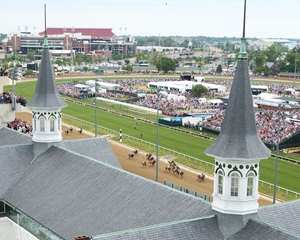Churchill Downs Implements New Safety Initiatives


Churchill Downs, seeking to improve its safety procedures following a dozen equine fatalities at the Louisville, Ky., track since April 27, announced eligibility changes and further safety precautions June 1 following a meeting between track officials and horsemen based there and at its off-track Churchill Downs Trackside training center.
Immediate changes announced at Thursday's meeting included:
- A pause of track-based incentives such as trainer start bonuses and purse payout allocations to every race finisher through last place. Purse payouts will now be limited to the top five finishers. Churchill Downs is engaged in ongoing discussions with horsemen to determine ways to reallocate these funds to best serve industry needs.
- Restricting the number of starts per horse to four during a rolling eight-week period.
- Ineligibility standards for poor performance. Horses that are beaten by more than 12 lengths in five consecutive starts will be ineligible to race at Churchill Downs until approved by the equine medical director to return.
Some of the changes were made in obvious response to at least a portion of the dozen fatalities.
Kimberley Dream, for example, euthanized from an injury in the first race at Churchill Downs May 27, lost each of her preceding five races by 14 1/2 lengths or larger margins, including three by 31 lengths or more.
The Thursday morning meeting included a presentation by California-based equine surgeon Dr. Ryan Carpenter, who provided educational information and tools to trainers and practicing veterinarians about advanced interventions that can be considered for certain equine injuries.
"The attending veterinarians and trainers at Churchill Downs are incredibly capable and knowledgeable," said Dr. Will Farmer, equine medical director for Churchill Downs Incorporated. "We feel a duty to provide the latest information on surgical interventions from an expert who experienced the challenges in California a few years ago that we currently face today. Any decision must be made first and foremost with the long-term well-being of the horse in mind. It is imperative that all available, educated, and informed options can be efficiently, confidently, and thoroughly relayed to the owners."

The actions from Churchill Downs come following a veterinary summit this week involving officials from Churchill Downs, the Horseracing Integrity and Safety Authority, and Kentucky Horse Racing Commission. The track surface this week also was independently examined by West Coast track superintendent Dennis Moore.
HISA officials were unable to provide an update Thursday afternoon with its takeaways from the summit and track evaluation, but a spokesperson said at 4:30 p.m. ET they would "release a statement soon."
Speaking on a National Thoroughbred Racing Association conference call on Thursday, trainer Brad Cox said he "did a lot of listening" during the horsemen's meeting with Churchill Downs officials. He called the veterinary staff at Churchill a "good team," led by Farmer.
The fatalities occurred on the dirt track and turf course, in racing and during training. One accident occurred in the paddock. At least three of the equine fatalities are not breakdowns—the paddock accident and two sudden deaths during or shortly after races on the turf course.
Cox expressed confidence in the Churchill Downs track surface and said his horses based there have been able to avoid any serious injuries this spring.
"I feel comfortable training at Churchill right now. ... We train a tremendous amount there. We have a lot of horses there and I feel it's a safe surface and we've had no serious issues," he said.
During the same conference call, Hall of Famer John Velazquez, who rode at Churchill Downs the week of the May 6 Kentucky Derby (G1) and serves as co-chair of the Jockeys' Guild, an organization that represents riders, said he is supportive of changes that make the sport safer.
He said he backs "giving horses time to recuperate and to be in the best shape to run races—that's the way it should be, not because they have an incentive to run in the race."
